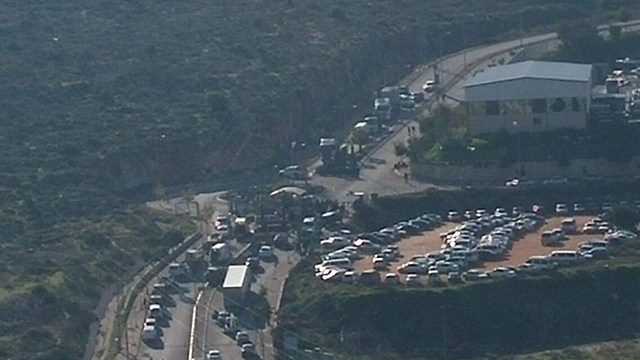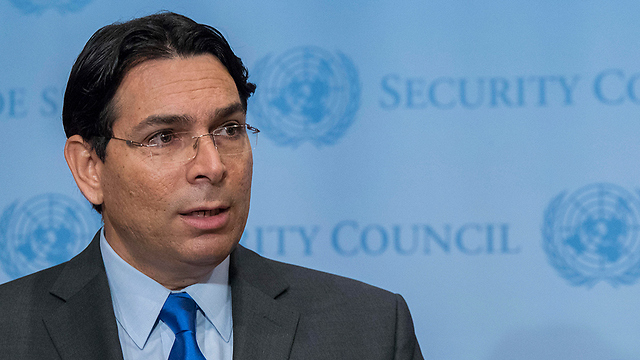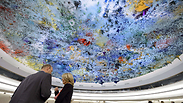

UNHRC publishes report on companies operating in settlements, withholds names
The United Nations Human Rights Council published a long-delayed report on companies, both Israeli and international, operating in settlements in the West Bank, east Jerusalem and Jordan Valley; due to Israeli, American efforts, however, the report left out names and only enumerated number of companies in each country.
The United Nations Human Rights Council (UNHRC) published its long-delayed blacklist report Wednesday of companies doing business linked to Israeli settlements in the West Bank. However, due to immense efforts exerted by both the United States and Israel, the published report included only the number of companies from each country, rather than naming them.
The UNHRC said it had identified 206 companies so far doing business linked to Israeli settlements, where it said violations against Palestinians are "pervasive and devastating."
"The majority of these companies are domiciled in Israel or the settlements (143), with the second largest group located in the United States (22). The remainder are domiciled in 19 other countries," the UN human rights office said in a statement.
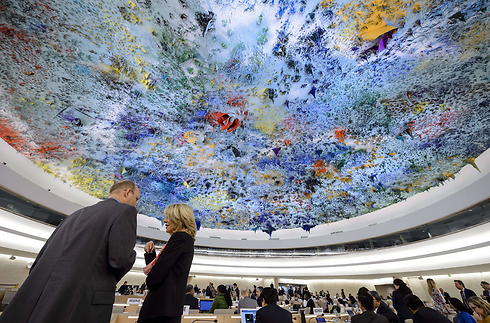
"Businesses play a central role in furthering the establishment, maintenance and expansion of Israeli settlements," the report continued. "In doing so, they are contributing to Israel's confiscation of land, facilitate the transfer of its population into the Occupied Palestinian Territory and are involved in the exploitation of Palestine's natural resources," it said.
The report said that the work in producing the UN database "does not purport to constitute a judicial process of any kind".
But businesses operating in the West Bank have a corporate responsibility to carry out due diligence and consider "whether it is possible to engage in such an environment in a manner that respects human rights", it said.
The report is politically sensitive because companies in the UN database could be targeted for boycotts or divestment aimed at stepping up pressure on Israel over its settlements.
Nevertheless, the US and Israel pushed to prevent the report—originally set to be published a month ago—from being made public. Towards that end, both Israel's Ambassador to the UN Danny Danon and his American counterpart Nikki Haley worked in tandem in the organization's New York headquarters.
Haley said in a statement on Wednesday that while the report "wisely refrained from listing individual companies, the fact that the report was issued at all is yet another reminder of the Council's anti-Israel obsession."
Despite the initial success, the fight to keep the information from being divulged has not been won, and is expected to continue in the coming months, on the backdrop of the American threat to withdraw from the UN group over its "anti-Israel bias."
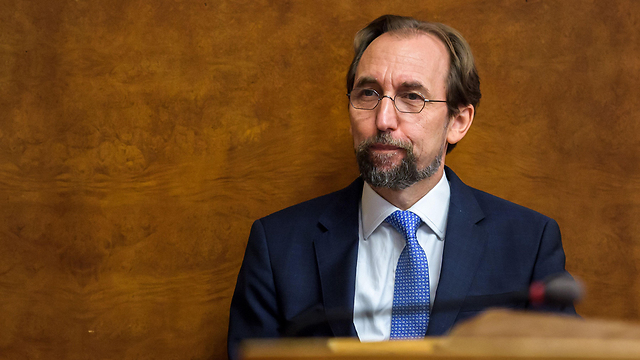
In October 2017, 130 Israeli companies and 60 international corporations operating in Israel received warning letters from United Nations High Commissioner for Human Rights Zeid bin Ra'ad al-Hussein cautioning them of their impending inclusion in a "blacklist" of companies active beyond the Green Line in "violation of international law and UN resolutions."
The list, which was to be published in December of that year, cited 25 well-known Israeli companies. The companies operate in different sectors—some in food manufacturing, others in services, pharmaceuticals and even high-tech—but have one thing in common: all operate in settlements, east Jerusalem and the Jordan Valley.
Among the companies in the commissioner's sights are Ahava, Dor Alon, Amisragas, Angel Bakeries, Arison Investments, Ashdar, Clal Industries, Café Café, Cellcom, Danya Cebus, Electra, HP, Hot, the Israel Aerospace Industries, Matrix Systems, Motorola, Nesher, Partner, Paz, Rami Levy, Remax, Housing & Construction (Shikun Binui), Shufersal, Sonol and Trima.
The above companies are joined by the 12 companies already published on Channel 2 News including Bank Hapoalim, Bank Leumi, Bezeq and Bezeq International, Coca Cola, Africa Israel, Teva, IDB, Egged, Mekorot, Netafim and Elbit Systems.
In an effort to scuttle the move, the pro-Israel American Israel Public Affairs Committee (AIPAC) lobby has been working in the US on promoting rapid legislation in Congress determining any company divesting its business dealings from Israel will be considered to have "capitulated" to the Arab boycott, and would thus be in violation of American law.
Israel's ambassador to the UN in Geneva Aviva Raz Shechter said her government was still studying the report, launched by a resolution of the UN Human Rights Council in March 2016, but rejected the concept as "fundamentally illegitimate".
"It is outside the competence and the authority of the Human Rights Council to deal with blacklisting ... This is part of the bias to try to delegitimise Israel," Raz Shechter told journalists.
Israel did not want to see the UN human rights office at the "forefront of a BDS (Boycott, Divestment, Sanction)" movement, she said.
Raz Shechter declined to discuss any of the Israeli companies or say whether some were state-owned, adding: "Companies are not engaged in any unlawful activities."
Ambassador Danon commented on the publication of the UNHRC's report, saying, "Precisely on the day the United Nations has chosen to commemorate International Holocaust Remembrance Day, the Council has chosen to disclose companies operating in Israel.
"This is a black mark on the UN's history that cannot be expunged and a disgrace for all eternity. We will continue operating using all means at our disposal, along with our allies around the world, to prevent the publication of this shameful list."
Reuters contributed to this report.














